|
|
|
Sort Order |
|
|
|
Items / Page
|
|
|
|
|
|
|
| Srl | Item |
| 1 |
ID:
095195
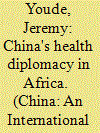

|
|
|
| 2 |
ID:
177776
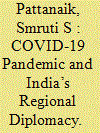

|
|
|
|
|
| Summary/Abstract |
The COVID-19 pandemic placed enormous stress on the fledgling health infrastructure in the South Asian region. The economic distress compounded the problem as many business houses closed down and people working in the informal sector lost their jobs. The governments in the region, except in Pakistan, went for a complete lockdown to contain the spread of the pandemic. India which prides itself as the ‘Pharmacy of the world’ geared up to provide humanitarian assistance by supplying essential medicines, ventilators and providing rapid-action teams consisting of medical professionals to assist its neighbours as a first responder. It also supplied vaccines to the immediate neighbourhood once they were ready. India’s health diplomacy enhanced its soft-power projection and helped it project itself as a country that is concerned about its neighbours—a major shift in its regional diplomacy, compared to the Cold War period. This article maps India’s regional diplomacy in the historical context and analyses the making of India’s regional diplomacy in the context of COVID-19 pandemic.
|
|
|
|
|
|
|
|
|
|
|
|
|
|
|
|
| 3 |
ID:
192637


|
|
|
|
|
| Publication |
New Delhi, KW Publishers Pvt Ltd, 2022.
|
| Description |
xxv, 398p.: tables, maps, figureshbk
|
| Series |
Asian Defence Review 2022
|
| Standard Number |
9789394915060
|
|
|
|
|
|
|
|
|
|
|
|
Copies: C:1/I:0,R:0,Q:0
Circulation
| Accession# | Call# | Current Location | Status | Policy | Location |
| 060450 | 327.2/CHO 060450 | Main | On Shelf | General | |
|
|
|
|
| 4 |
ID:
186837
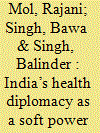

|
|
|
|
|
| Summary/Abstract |
India and Africa have been sharing a multidimensional relationship of cooperation and friendship since the ancient civilizations. The COVID-19 pandemic has brought new possibilities and opportunities for India to leverage its soft power diplomacy towards Africa. The paper’s main focus is to analyze how India has made soft power part of its foreign policy and examine India’s relationship with the African continent through health diplomacy. A literature search was done in major databases, such as Web of Science, Medicine/PubMed, Scopus, OVID, and Google Scholar search engine to gather relevant information. Through humanitarian assistance and geopolitical influence, India had won the support and heart of Africans. Besides, India has become a global healthcare provider in the African continent through its global health diplomacy and vaccine diplomacy. India has achieved impressive gains through its soft power diplomacy and has become a compassionate and benevolent actor in the African continent.
|
|
|
|
|
|
|
|
|
|
|
|
|
|
|
|
| 5 |
ID:
148211
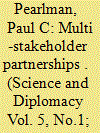

|
|
|
|
|
| Summary/Abstract |
Overwhelming evidence points to the rising burden of noncommunicable diseases (NCDs) in low- and middle-income countries (LMICs).
|
|
|
|
|
|
|
|
|
|
|
|
|
|
|
|
| 6 |
ID:
177777
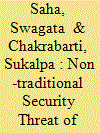

|
|
|
|
|
| Summary/Abstract |
South Asia has emerged as a major challenge in dealing with COVID-19 virus in terms of its demographics, economy, social values, political ambition and geographical location. The pandemic viewed through the prism of non-traditional security (NTS) threat presents new challenges and demands reworking of conventional governance mechanisms. India is the South Asian hegemon, and China is the single largest immediate neighbour with expansionist ambition in the region. Two most populous countries—one has been the epicentre of the virus, while the other is one of the most widely affected. Their public health and governance trajectory during the pandemic and their health diplomacy in the region have overtures for security architecture of South Asia in post-COVID-19 world. A lone statist approach and legal–institutional officialdom fail to appreciate the instrumentalities of an unconventional security threat like COVID-19. This calls for a more inclusive and comprehensive approach to deal with NTS threat, in general, and epidemiological disease, in particular. This by no means indicating a retreat of the state rather a proactive role in articulating interests of more inclusive categories and, in doing so, the state consolidates its role of governance and becomes a significant point of integration.
|
|
|
|
|
|
|
|
|
|
|
|
|
|
|
|
| 7 |
ID:
180346


|
|
|
|
|
| Summary/Abstract |
Trust between actors is vital to delivering positive health outcomes, while relationships of power determine health agendas, whose voices are heard and who benefits from global health initiatives. However, the relationship between trust and power has been neglected in the literatures on both international politics and global health. We examine this relationship through a study of relations between faith based organisations (FBO) and donors in Malawi and Zambia, drawing on 66 key informant interviews with actors central to delivering health care. From these two cases we develop an understanding of ‘trust as belonging’, which we define as the exercise of discretion accompanied by the expression of shared identities. Trust as belonging interacts with power in what we term the ‘power-trust cycle’, in which various forms of power undergird trust, and trust augments these forms of power. The power-trust cycle has a critical bearing on global health outcomes, affecting the space within which both local and international actors jockey to influence the ideologies that underpin global health, and the distribution of crucial resources. We illustrate how the power-trust cycle can work in both positive and negative ways to affect possible cooperation, with significant implications for collective responses to global health challenges.
|
|
|
|
|
|
|
|
|
|
|
|
|
|
|
|
| 8 |
ID:
139584


|
|
|
|
|
| Summary/Abstract |
Tackling germs, negotiating norms, and securing access to medicines are persistent challenges that disproportionally affect developing countries' participation in global health governance. Furthermore, over the last two decades, the excessive focus on global pandemics and security in global health diplomacy, rendered peripheral diseases that usually strike the poor and vulnerable, creating situations of marginalisation and inequality across societies. However, as the importance of regions and regionalism increases in global politics, and integration ambitions and initiatives extend beyond trade and investment to embrace welfare policy, there are new opportunities to explore whether and how regional commitments affect health equity and access to medicine in developing nations. What, if any, are the possibilities for meso-level institutions to provide leadership and direction in support of alternative practices of global (health) governance? Can regional polities become international advocacy actors in support of global justice goals? This article addresses these questions by analysing regional health diplomacy in South America. The article argues that regional organisations can become sites for collective action and pivotal actors in the advocacy of rights (to health) enabling diplomatic and strategic options to member state and nonstate actors, and playing a role as deal-broker in international organisations by engaging in new forms of regional health diplomacy.
|
|
|
|
|
|
|
|
|
|
|
|
|
|
|
|
| 9 |
ID:
177655


|
|
|
|
|
| Summary/Abstract |
US-China health cooperation reaches back to the signing of
the bilateral Science and Technology Umbrella Agreement,
their first agreement after normalization of diplomatic relations in 1979. Bilateral cooperation has shaped the China
Center for Disease Control and Prevention (China CDC) and
produced some of the world’s finest epidemiological research over the last thirty years. US-China research and technical cooperation has covered the full range of health-related topics, with no area given more attention than research
and technical cooperation on emerging infectious diseases. In the wake of the outbreak of severe acute respiratory syndrome (SARS), the United States ramped up the staff
presence of its Center for Disease Control (CDC) in China.
Although this changed in the Obama years, as China’s epidemiological capacity developed rapidly, the dramatic shift
occurred with the Trump administration, whose cuts, just as
COVID-19 arose as the largest epidemiological threat to the
world in a century, left only a skeleton staff in place, and the
US government without eyes and ears on the ground. Nonetheless, there is a reservoir of mutual respect and willingness
to cooperate among the health professionals in both countries. If there is political will, this could become the foundation for a next-phase bilateral health relationship.
|
|
|
|
|
|
|
|
|
|
|
|
|
|
|
|
| 10 |
ID:
148208
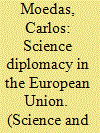

|
|
|
|
|
| Summary/Abstract |
As the executive body of the European Union (EU), the European Commission represents the interests of the EU as a whole through its right of legislative initiative, its executive functions, and its duties of representation regarding the EU’s twenty-eight member states. Under the leadership of President Jean-Claude Juncker, the commission is carving out a new, more political role for itself. At a time of great political uncertainty—exacerbated by the sovereign debt crisis and the sensitive political and humanitarian consequences of nearby conflicts in Ukraine and Syria—the commission must demonstrate clear political leadership in the interests of Europe.
|
|
|
|
|
|
|
|
|
|
|
|
|
|
|
|
| 11 |
ID:
145720


|
|
|
|
|
| Summary/Abstract |
The Tsunami in South-East Asia in 2004 prompted the largest military disaster response in history. Encouraged by the success, increasing attention has been paid to the various humanitarian assistance and disaster relief activities conducted by US armed forces. Since 2006, the US Navy deploys one of its two large hospital ships in annual missions to either Central and South America or the Asia–Pacific region to provide people in need with free care. These missions offer many opportunities to increase the soft power capital of the United States by forging ties with host nation governments and improving the image of the United States within the local population. However, this article argues that we need more research on the impact of humanitarian assistance to justify a continuation in a fiscally constrained environment.
|
|
|
|
|
|
|
|
|
|
|
|
|
|
|
|
|
|
|
|
|